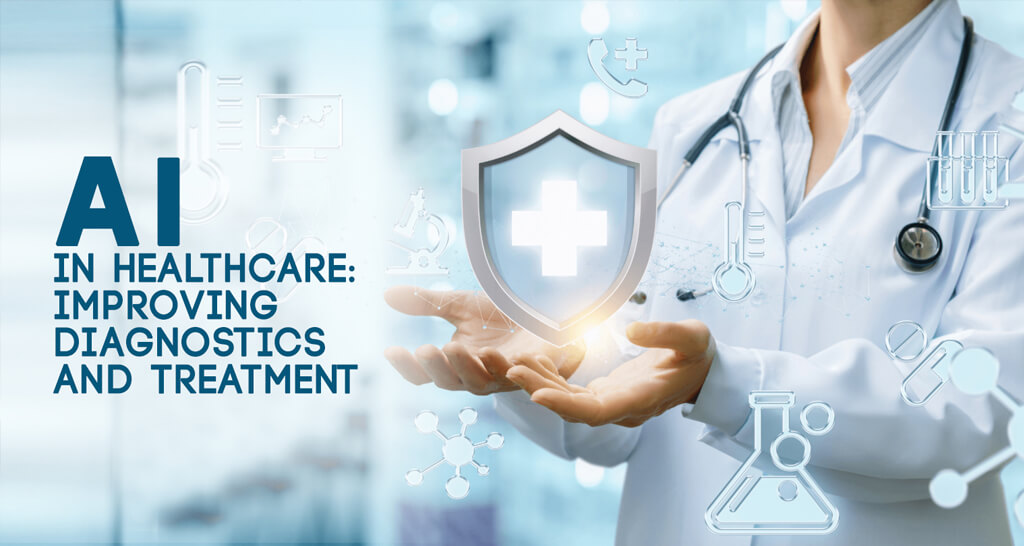Artificial intelligence (AI) is becoming essential in changing the healthcare industry in many ways. It is very much important to improve the outcomes of the patients to streamline administrative tasks. Improving diagnosis and treatment is one of the prominent roles of healthcare performed by artificial intelligence. Artificial intelligence is already used in healthcare, but it is upgraded to address the challenges addressed in healthcare departments. AI is also becoming a more powerful tool in diagnosis and treatment. Artificial intelligence makes the hospital system more intelligent, faster, and more efficient.
Improvement in the Healthcare Diagnostics:
Many ways of AI are more helpful for physicians in improving diagnosis and treatment. The treatment plans and other follow-up actions are effectively monitored after analyzing the treatment with the patient data. Information about the patients is securely stored as data. They also have an improved messaging system that is more helpful for getting the ongoing problems of the patient. AI is developing new, more effective drugs targeting with enhanced efficacy and reducing adverse drug reactions in the healthcare department. Currently, hundreds of startups are available to discover drugs using AI.
- Effectiveness of AI Diagnostics
Many studies are appreciating the evidence of AI for the treatment and diagnostics in health care centers. Recently a study showed that an AI neural network deducted lung cancer in medical images. They are faster than trained radiologists. Recently breast cancer was directed by the AI deduction with an accuracy of 95%. Trained doctors also use artificial intelligence to predict eye diseases. Artificial intelligence can learn quickly and classify diseases. These were having more accuracy and speed in the diagnosis and also for better treatment. Even diseases in the brain are also diagnosed by artificial intelligence, and more helpful for giving medicine.
- AI-Assisted Diagnostics and Treatment
All clinical practices do not widely use AI, but they are getting closer to reality.
Companies and governments are investing more in the construction of AI laboratories. The FDA approves several algorithms of artificial intelligence. Artificial intelligence can learn as it goes is the main advantage. Pharmaceutical companies need to be faster than artificial intelligence and are now using the benefits of investing in artificial intelligence. There is no AI-created drug treatment on the market. It is expected to get these AI-created drugs as soon as possible. Getting AI technology to patients is still tricky for the health center. The AI deep-cleaning models are used to identify chronic conditions like epilepsy and multiple disorders.
- Diagnosis and Treatment Applications
AI has been essential in diagnosing and treating diseases for 50 years. The early rule-based system has the potential for the accuracy of diagnosing and treating the disease. The clinical practices do not accept this. The rule-based or artificial intelligence algorithm can challenge clinical workflows and their systems. There are more difficulties in adapting AI in healthcare because of the integration issues into healthcare organizations. Many of the AI and healthcare capabilities of diagnosis. Doing substantial integration projects to take full advantage of artificial intelligence would be best. The capability of third-party vendors will have AI capabilities.
- Administrative Applications
AI plays a vital role in the administrative aspect of the healthcare department. The data entry client processing and appointment scheduling uses artificial intelligence to simplify the process. Artificial intelligence can analyze the medical history of a patient. This will make it easy to deliver better and faster results for healthcare providers. Artificial intelligence makes the autonomy processes very easy in their workflow process. They are used in the diagnostics of many non-curable diseases in the form of many AI devices. More doctors are using AI for the treatment of many diseases easily. They will be making the work of the doctors easier.
- Challenges and Opportunities
AI can revolutionize the diagnosis and treatment in the healthcare department. It is facing many challenges that are to be addressed. The accuracy and reliability of AI algorithm is the main challenge for artificial intelligence. It will disturb the treatment of the patient and also may lead to ineffective treatment by the doctors. So it is very important to use AI treatment with more responsibility. The data of the patient should be kept secret, and there should be privacy for protecting their data using artificial intelligence. The patient should be get benefited from using AI ineffective treatment. Artificial intelligence is giving more opportunities in the medical field.
Conclusion
In diagnosing and treating the disease of patients, artificial intelligence is used in healthcare departments. Artificial intelligence has more potential for medical innovations. Artificial Intelligence does the innovation by analyzing a large amount of data. This analysis will make artificial intelligence more helpful in diagnosis and treatment.



Discussion about this post